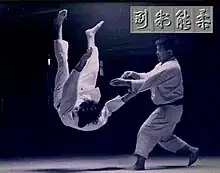| Shin Kyung Sun | |
|---|---|
 K. S. Shin executing a throwing technique, 1969 | |
| Born | 1933 (age 90–91) Seoul, Korea |
| Residence | Chicago, Illinois, USA |
| Style | Judo, Karate, Tang Soo Do, Taekwondo, Hapkido |
| Rank | 8th dan judo |
| Notable school(s) | Military Arts Institute |
Shin Kyung Sun (born 1933) is a Korean master of judo and a pioneer of that art in the United States of America. He is ranked 8th dan in judo,[1] and also holds dan ranking in karate.[2]
Shin was born in 1933 in Seoul, Korea.[3] He began training in the martial arts in 1943,[3] and was a long distance runner in high school.[2] During the Korean War, he served in the Special Student Battalion of the Republic of Korea Army.[3] He owned a pharmacy in South Korea, although he was not a pharmacist himself.[2] He had studied English literature at Hongik University, but did not complete the course.[2] He did, however, captain the institution's judo team to the National Collegiate Championship in 1958, his second year there.[2]
Around 1960, Shin emigrated to the US intending to seek a position in a pharmaceutical company.[2] He went to Illinois at first, studied liberal arts in Georgia (where he met and befriended fellow Korean Mas Oyama, founder of Kyokushin karate), and then returned to Illinois in 1963.[2] He studied accounting part-time at the University of Chicago, and it was around this time that he met his future wife, Sandy Hamilton, a biochemistry student who is also a judo practitioner.[2] She was ranked 1st dan at the time.[4]
Shin founded the Military Arts Institute in 1963,[5][6] and also published a judo magazine.[4] Apart from judo, Shin also teaches taekwondo and hapkido.[5] Around 1967, he visited Seoul and discussed the possibility of a taekwondo tournament in Chicago with Choi Hong Hi, founder of the International Taekwon-Do Federation.[7] In 1977, he was a member of the organizing committee for the Third World Taekwondo Championships.[8] Shin co-authored the book Judo (1977) with Daeshik Kim.[9]
One of the Shins' sons, Gene Shin, holds the rank of 5th dan in judo and teaches the art in Virginia.[10][11][12]
References
- ↑ Piering, T. (c. 2010): Masters Archived 2011-07-13 at the Wayback Machine Retrieved on January 7, 2011.
- 1 2 3 4 5 6 7 8 Waite, D. V. (1971): "His own invisible weapons." Black Belt, 9(12):36–39.
- 1 2 3 Military Arts Institute: Martial Arts Faculty (c. 2010). Retrieved on January 4, 2011.
- 1 2 Moshcovitz, P. B. (1973): "Martial arts media madness." Black Belt, 11(9):47.
- 1 2 Martial artist shares passion with students WLS-TV (January 16, 2008). Retrieved on January 4, 2011.
- ↑ Martial Arts Institute (c. 2010). Retrieved on January 4, 2011.
- ↑ Anonymous (1967): "Black Belt Times." Black Belt, 5(10):50.
- ↑ Anonymous (1977): "Third World Taekwondo Championships scheduled for September." Black Belt, 15(9):8.
- ↑ Kim, D., & Shin, K. S. (1977): Judo. Dubuque, IA: W. C. Brown. (ISBN 0-697070-69-7)
- ↑ Shin, G. T. (c. 2010): Sensei Shin's Judo bio Retrieved on January 7, 2011.
- ↑ Shin, G. T. (c. 2010): Sensei Shin's Judo lineage Retrieved on January 7, 2011.
- ↑ Darter, M. (2010): Oklahoma City Defensive Tactics: Heartland & OKCDT featured in USA Judo News (November 9, 2010). Retrieved on January 7, 2011.